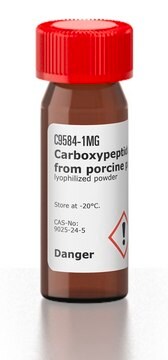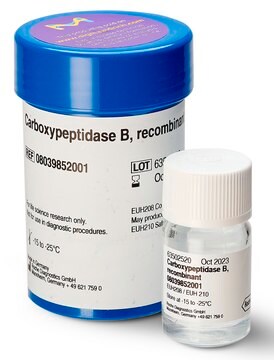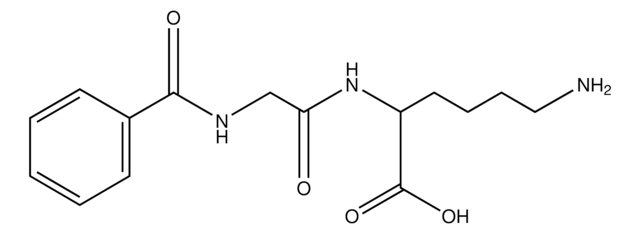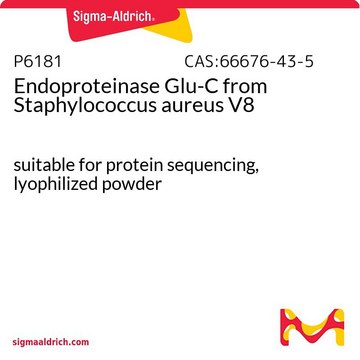C5233
Carboxypeptidase B from human pancreas
50-55 units/mg protein carboxypeptidase B
Sinónimos:
Peptidyl-L-Lysine[L-arginine] hydrolase
About This Item
Productos recomendados
biological source
human pancreas
Quality Level
form
solution
specific activity
50-55 units/mg protein carboxypeptidase B
impurities
≤0.2% chymotrypsin
≤0.2% trypsin
≤1 unit/mg protein carboxypeptidase A
UniProt accession no.
shipped in
dry ice
storage temp.
−20°C
InChI
1S/C31H38N4O7S/c1-20(32-26(36)15-16-27(37)38)28(39)33-21(2)30(41)35-17-9-14-25(35)29(40)34-24(18-22-10-5-3-6-11-22)31(42)43-19-23-12-7-4-8-13-23/h3-8,10-13,20-21,24-25H,9,14-19H2,1-2H3,(H,32,36)(H,33,39)(H,34,40)(H,37,38)
InChI key
TWURVFFNODFJBJ-UHFFFAOYSA-N
Gene Information
human ... CPB1(1360)
General description
Application
Biochem/physiol Actions
Unit Definition
Physical form
Storage Class
12 - Non Combustible Liquids
wgk_germany
WGK 1
flash_point_f
Not applicable
flash_point_c
Not applicable
Certificados de análisis (COA)
Busque Certificados de análisis (COA) introduciendo el número de lote del producto. Los números de lote se encuentran en la etiqueta del producto después de las palabras «Lot» o «Batch»
¿Ya tiene este producto?
Encuentre la documentación para los productos que ha comprado recientemente en la Biblioteca de documentos.
Los clientes también vieron
Nuestro equipo de científicos tiene experiencia en todas las áreas de investigación: Ciencias de la vida, Ciencia de los materiales, Síntesis química, Cromatografía, Analítica y muchas otras.
Póngase en contacto con el Servicio técnico









